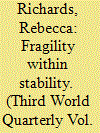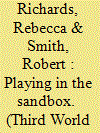| Srl | Item |
| 1 |
ID:
171931


|
|
|
|
|
| Summary/Abstract |
Even in the context of a relatively flourishing state, fragility can be an enduring feature of a political system, particularly in the case of recently established or unrecognised states. This article examines the nature of state-building in a specific context to question the assumption that forms of hybrid governance or pre-existing forms of governance are a necessary evil to be tolerated but which needs ultimately to be overcome during state-building. It does this by adopting the language of resilience and focusing on the case of Somaliland to highlight the role of clan governance as a mechanism of political resilience and as a means of promoting the flexibility required for state-building. Yet, at the same time, the process of state-building often involves formalising governance and limiting the role of traditional social-political forms of governance such as clans, ignoring their role in legitimating and stabilising the political system. However, as this article argues, stability and fragility are inextricably linked; while the clan system has been an important force in stabilising the state, it has also become a pressure point for the state’s latent fragility. By contextualising fragility and stability within the language of resilience, though, this symbiotic relationship can be better analysed.
|
|
|
|
|
|
|
|
|
|
|
|
|
|
|
|
| 2 |
ID:
141140


|
|
|
|
|
| Summary/Abstract |
For unrecognised states in the international system recognition of sovereign statehood is the ultimate goal. Not being ‘a state’ means being excluded from global networks. However, even in the most basic definitions and criteria for unrecognised states there is a period of relative autonomy accorded due to non-recognition. This is a period when political actors can use isolation to establish the state’s narrative, identity and structure. It is this period that provides the foundations for external interaction. It is in this period that the state is born. This article examines another side to the politics of recognition: the politics of non-recognition. Drawing on the contemporary examples of Somaliland and Kurdistan, the article assesses the benefits as well as the costs of non-recognition.
|
|
|
|
|
|
|
|
|
|
|
|
|
|
|
|